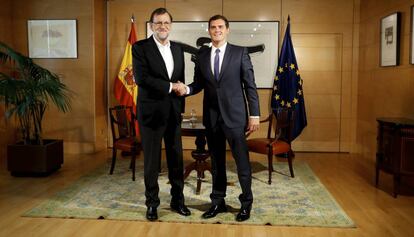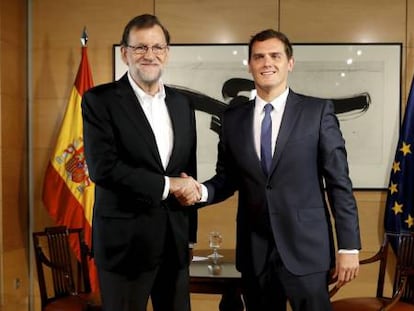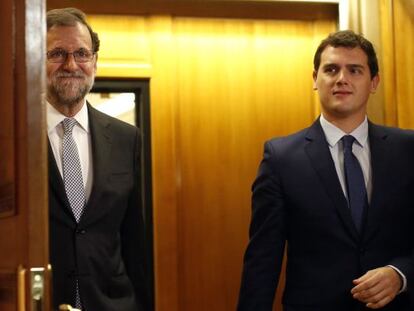Acting PM on course to accept six requirements of Ciudadanos party
But Popular Party’s Mariano Rajoy will first want to iron out the details of deal to support investiture


The Popular Party’s executive committee is expected today to broadly approve a list of six demands issued by the minority Ciudadanos party to Mariano Rajoy in return for supporting the acting prime minister’s bid to form a government later this month.
Wednesday’s meeting comes a week after Ciudadanos leader Albert Rivera released his six points: Rajoy must set a date for his investiture debate in Congress, expel party officials targeted in corruption investigations, end judicial privileges for elected officials, change the electoral law, end amnesties and pardons in corruption cases, limit the prime minister’s mandate, and create a parliamentary commission to look into the so-called Barcenas case, involving illegal cash payments to PP officials.
“Some measures are not sufficiently specific to be able to give a simple yes or no,” said Fernando Martínez-Maillo, the PP’s vice-secretary. In the meantime, the government has put together a report on the legal implications of eliminating judicial privileges or changing the electoral system.
Assuming the PP’s executive committee approves the proposals, if it is to begin talks on adding Ciudadanos’ 32 seats to its own 137 – which would still leave it short of the 176 required for a simple majority – then Rajoy will have to announce a date for his investiture debate in Congress, where his proposals to form a government would be put to the vote. Sources in the PP say late August is the most likely time for an investiture vote.
“Some measures are not sufficiently specific to be able to give a simple yes or no,” said the PP’s vice-secretary about the demands
So far, Rajoy has refused to set such a date, saying he first needs to know whether the main opposition Socialist Party (PSOE) is prepared to abstain.
Socialist leader Pedro Sánchez risks being left on the sidelines as Rivera takes the political initiative. Former Socialist premier Felipe González, who served four successive mandates between 1982 and 1996, has called on his party to allow Rajoy to form a government.
The 36-year-old Rivera, a former member of the PP who has led Ciudadanos since it was set up in 2006, has described Sánchez as having “turned his back on Spain,” adding that he has “disappeared politically”, and that he “cannot be counted on regarding affairs of state.”
Both Rivera and Rajoy have called on Sánchez to agree to abstain at an investiture debate.
On the question of electoral reform, the PP says Ciudadanos is seeking to “benefit itself” by introducing greater proportional representation. “Reforms to the voting system have always been done with the support of the two biggest parties: the PP and the PSOE, and it would have to be seen how the proportionality Ciudadanos is calling for would be reached,” said Maillo, adding: “Rivera is aware that all this cannot be done overnight.”
An internal debate is already underway within the PP on greater transparency in preparing lists of candidates in elections, with Cristina Cifuentes, head of the Madrid regional government, calling for a primaries system to elect candidates. Similarly, the party sees little problem in formally limiting prime ministers to two terms.
If Rajoy wins his bid, a commission to look into government corruption could turn into “a collective trial against the PP”
Rita Barberá, the former mayor of Valencia and a leading figure in the PP for the last two decades, will not be attending Wednesday’s meeting of the executive committee, which will discuss Ciudadanos’ demands for an end to judicial privileges – whereby members of Congress can only be tried by the Supreme Court – as well as for any elected official targeted in a corruption investigation to automatically be required to resign. Barberá is accused of overseeing a kickbacks-for-contracts network during her time as mayor of Valencia. Sources in the PP say it is likely that she will be sacrificed, describing her position as “very difficult.” Now a senator, Barberá could however refuse to go quietly and instead declare herself an independent and try to wait out the judicial investigation.
The PP points out that ending judicial privileges would require a change to the Constitution, and thus the support of the other main parties in Congress.
The PP will likely try to have any parliamentary commission set up to investigate accusations into illegal financing extended to all parties, but it also knows that the opposition could push through the commission. The PSOE has already requested a commission into “illegal financing and other corruption networks affecting the PP.” Cifuentes has described any such commission as “a collective trial against the PP,” but believes “it’s better to collaborate than oppose it.”
The PP now accepts that amnesties for officials found guilty of corruption are a thing of the past: former Justice Minister Alberto Ruiz-Gallardón pardoned seven people in 2014, but the PP included an end to such practices when it sent an offer to the PSOE and Ciudadanos as part of negotiations in the wake of the inconclusive elections in December.
Once the PP’s National Executive Committee (which has never taken a decision against the party’s leader) has met, Rajoy is due to meet with Ciudadanos’ Albert Rivera later this week. After their last meeting he said that a date for the investiture debate, would be announced following the executive committee’s meeting.
Sign up for our newsletter
EL PAÍS English Edition has launched a weekly newsletter. Sign up today to receive a selection of our best stories in your inbox every Saturday morning. For full details about how to subscribe, click here
English version by Nick Lyne.
Tu suscripción se está usando en otro dispositivo
¿Quieres añadir otro usuario a tu suscripción?
Si continúas leyendo en este dispositivo, no se podrá leer en el otro.
FlechaTu suscripción se está usando en otro dispositivo y solo puedes acceder a EL PAÍS desde un dispositivo a la vez.
Si quieres compartir tu cuenta, cambia tu suscripción a la modalidad Premium, así podrás añadir otro usuario. Cada uno accederá con su propia cuenta de email, lo que os permitirá personalizar vuestra experiencia en EL PAÍS.
En el caso de no saber quién está usando tu cuenta, te recomendamos cambiar tu contraseña aquí.
Si decides continuar compartiendo tu cuenta, este mensaje se mostrará en tu dispositivo y en el de la otra persona que está usando tu cuenta de forma indefinida, afectando a tu experiencia de lectura. Puedes consultar aquí los términos y condiciones de la suscripción digital.










































